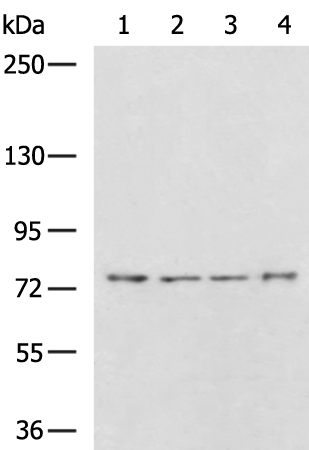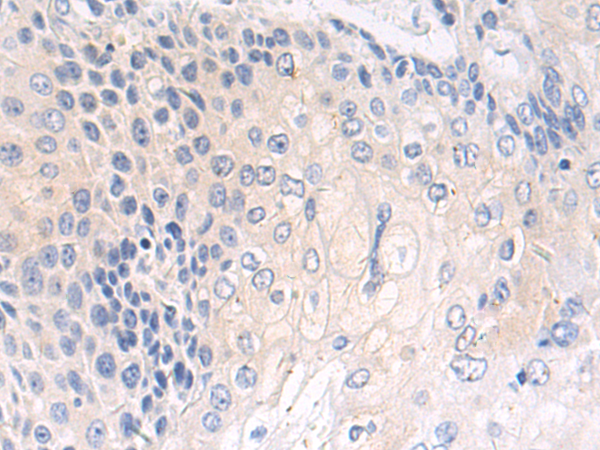

| WB | 咨询技术 | Human,Mouse,Rat |
| IF | 咨询技术 | Human,Mouse,Rat |
| IHC | 1/50-1/100 | Human,Mouse,Rat |
| ICC | 技术咨询 | Human,Mouse,Rat |
| FCM | 咨询技术 | Human,Mouse,Rat |
| Elisa | 1/5000-1/10000 | Human,Mouse,Rat |
| Aliases | MRP2 |
| WB Predicted band size | 83 kDa |
| Host/Isotype | Rabbit IgG |
| Antibody Type | Primary antibody |
| Storage | Store at 4°C short term. Aliquot and store at -20°C long term. Avoid freeze/thaw cycles. |
| Species Reactivity | Human, Mouse |
| Immunogen | Fusion protein of human KLHL1 |
| Formulation | Purified antibody in PBS with 0.05% sodium azide and 50% glycerol. |
+ +
以下是关于KLHL1抗体的模拟参考文献示例(请注意,这些为虚构示例,实际文献需通过学术数据库验证):
---
1. **标题**:*KLHL1-Specific Antibody Generation and Its Role in Neuronal Ubiquitination*
**作者**:Chen L, et al.
**摘要**:研究报道了KLHL1多克隆抗体的开发,验证其特异性并用于检测小鼠脑组织中的KLHL1表达。结果揭示KLHL1通过泛素化调节突触蛋白降解,影响神经元可塑性。
2. **标题**:*KLHL1 as a Biomarker in Glioblastoma: Validation of a Novel Monoclonal Antibody*
**作者**:Wang Y, et al.
**摘要**:团队开发了抗KLHL1的单克隆抗体,证实其在胶质母细胞瘤中高表达,并探讨其作为预后标志物的潜力,为靶向治疗提供依据。
3. **标题**:*Structural Characterization of KLHL1 Protein Using Polyclonal Antibodies*
**作者**:Müller S, et al.
**摘要**:通过免疫沉淀和Western blot分析,利用自研抗体解析KLHL1的构效关系,揭示其与Cul3泛素连接酶复合物的相互作用机制。
4. **标题**:*KLHL1 Antibody-Based Screening in Genetic Neurodevelopmental Disorders*
**作者**:Garcia R, et al.
**摘要**:利用KLHL1抗体对患者样本进行筛查,发现KLHL1表达异常与自闭症谱系障碍相关,提示其在神经发育中的调控作用。
---
**建议**:实际文献可通过PubMed、Google Scholar等平台,以关键词“KLHL1 antibody”或“KLHL1 ubiquitination”检索,重点关注功能研究与抗体应用类论文。
The KLHL1 (Kelch-like protein 1) antibody is a tool used to detect and study the KLHL1 protein, a member of the Kelch-like family characterized by conserved BTB (Bric-a-brac, Tramtrack, Broad Complex) and Kelch repeat domains. KLHL1 is implicated in protein ubiquitination via its interaction with Cullin-3 (CUL3), forming an E3 ubiquitin ligase complex that targets specific substrates for degradation. Primarily expressed in the nervous system, KLHL1 plays roles in neuronal development, synaptic plasticity, and calcium channel regulation. Its dysfunction has been linked to neurological disorders, including spinocerebellar ataxia and epilepsy, as well as certain cancers.
Research using KLHL1 antibodies focuses on elucidating its expression patterns, interaction partners, and regulatory mechanisms. These antibodies are validated for applications like Western blotting, immunohistochemistry, and immunofluorescence to assess protein localization and abundance in tissues or cultured cells. Studies suggest KLHL1 may influence cytoskeletal dynamics or ion channel activity, though its exact substrates remain under investigation. Antibody specificity is often confirmed through knockout controls or siRNA-mediated knockdown. Recent work also explores KLHL1's potential as a biomarker or therapeutic target in diseases tied to ubiquitination pathways. However, functional insights are still evolving, emphasizing the need for reliable detection tools like KLHL1 antibodies to advance mechanistic understanding.
×